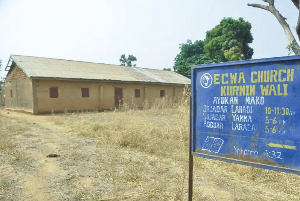The Institute of Energy Security (IES) has raised red flags against the sale of thermal plants owned by the Volta River Authority (VRA), pointing out that it could be a case of handing over the assets to cronies.
In a statement on Wednesday, August 30, Principal Research Analyst at IES said: “Government’s announcement of the sale of some thermal plants owned by the Volta River Authority (VRA) comes as a surprise to the Institute for Energy Security (IES).
“It is not out of place to boost private sector participation in the power sector, but to suggest inefficiency on the part VRA as the reason to sell off some thermal plants of the state institution to private players is misleading, mischievous and an attempt to bequeath the thermal assets to cronies. The situation is one of giving a dog a bad name in order to hang it.”
IES is, therefore, advising government to rescind its decision as it argues that VRA can be profitable without necessarily selling its assets to private entities.
IES further entreated all stakeholders, staff and management of VRA and all Ghanaians to resist the sale of the assets in question.
Below is the full statement:
RECONSIDER SALE OF VRA ASSETS
Government’s announcement of the sale of some thermal plants owned by the Volta River Authority (VRA) comes as a surprise to the Institute for Energy Security (IES).
This comes after the president disclosed in Parliament in February 2017, the possibility of listing VRA and Ghana Grid Company (GRIDCO) on the Stock Exchange. Subsequently, the Minister of Finance has also indicated a restructuring of the power sector by bringing all hydropower generation under VRA and creating a thermal market under a new entity (SPV) with private sector participation.
It is not out of place to boost private sector participation in the power sector, but to suggest inefficiency on the part of VRA as the reason to sell off some thermal plants of the state institution to private players is misleading, mischievous and an attempt to bequeath the thermal assets to cronies. The situation is one of giving a dog a bad name in order to hang it.
Today, VRA is saddled with operational and financial challenges as a result of successive governments’ actions and inactions, which include:
1. Government making decisions for VRA without the authority’s involvement and committing VRA to these decisions. A typical example is the selection and contracting of power projects with very high cost without allowing VRA to source and plan for the projects.
2. Government’s application of a composite pricing formula to VRA’s power while negotiating a standard tariff with Independent Power Producers (IPPs). Under such circumstance, VRA cannot be competitive, as full cost recovery of power produced will not be realised.
3. VRA operating without a Power Purchase Agreement (PPA) with its sole off-taker ECG; when all IPPs have a PPA with the off-taker, thus rendering IPPs more liquid (in terms of cash) than VRA.
4. VRA procuring fuels for some IPP plants and there are usually payment defaults, resulting in the need for government to help VRA establish letters of credit for crude oil. It must be noted that about 70% of VRA’s debt is fuel consumed by IPPs including Ameri, CENIT and Tico/Taqa.
5. Government deliberately depriving VRA of the needed funds to undertake preventive and corrective maintenance of plants under its watch, thus leaving some thermal plants of the state in poor condition.
For these reasons, the Volta River Authority can’t be said to have limited capacity to operate efficiently and effectively, these thermal assets, when government interferes in its operations and micromanages the institution. And for strategic nature of VRA, any attempt to cede part of its assets to private players is an attempt to dilute the state’s control in the energy sector that serves as leverage.
Also, the job security of staff of the state institution as well as the fair price to pay by citizens to consume electricity is not guaranteed. On the back of these threats, the Institute for Energy Security wishes to appeal to government to reconsider the sale; and ensure that VRA recovers fully its operational cost as determined by standards, ensure that ECG and all IPPs who owe VRA fulfil their obligation, and allow VRA to operate without the unnecessary interference.
IES also urges all stakeholders, staff and management of VRA and Ghanaians to resist the sale of these assets.
Signed: Richmond Rockson (Principal Research Analyst)
Business News of Wednesday, 30 August 2017
Source: classfmonline.com













